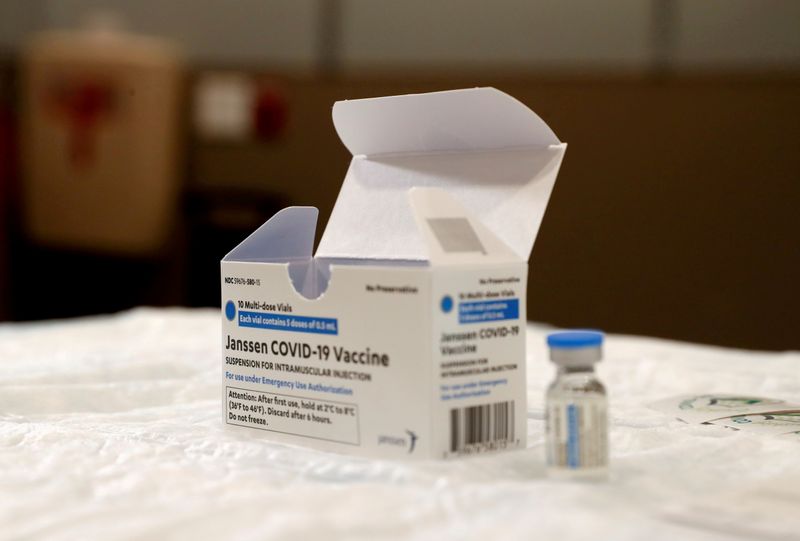By Pushkala Aripaka, Anthony Deutsch and John Miller
(Reuters) -Europe's drug regulator has found a possible link between Johnson & Johnson (NYSE:JNJ)'s COVID-19 vaccine and rare blood clotting issues in adults who received doses in the United States, but backed its overall benefits against any risks.
The European Medicines Agency (EMA) said on Tuesday its safety committee had concluded that a warning about unusual blood clots with low platelets must be added to the vaccine's labels, just as has also been required of rival shot maker AstraZeneca (NASDAQ:AZN).
The questions over the J&J shot have dealt a further blow to the EU's vaccination programme, which has lagged rollouts in Britain and the United States due to supply delays as well as safety concerns. Rising infections caused by more infectious variants have forced France and others to reimpose lockdowns.
The review of a handful of cases prompted a pause in the rollout of the J&J vaccine in Europe and the United States last week, the latest setback to efforts to tackle the pandemic, which has killed more than 3.1 million and infected 142.1 million worldwide.
While the regulator said it considers the vaccine safe, it was up to the European Union's member states to decide how to use it, taking a similar stance to that with AstraZeneca.
"I have to stress again (the cases) are very rare and in the vast majority of cases these vaccines are going to prevent death and hospitalisation from COVID-19," EMA executive Director Emer Cooke said in a briefing.
"We have to balance the benefits of the vaccine with the risks."
Several nations have suspended or limited the use of AstraZeneca's vaccine over possible blood clots. (https://
The EMA examined eight cases of clotting that occurred in U.S. adults under 60 years, mostly women, within three weeks of vaccination with J&J's single shot. The cases were reported out of more than 7 million doses administered in the United States as of April 13.
If treated early, health care professionals can help people in their recovery and avoid further complications, Sabine Straus, chair of EMA's safety committee, told the briefing.
EXTREMELY RARE CLOTTING
With both the AstraZeneca and J&J vaccines, the reports involve extremely rare clotting, mainly a type of blood clot called cerebral venous sinus thrombosis (CVST), which was seen in combination with low levels of blood platelets, called thrombocytopenia.
J&J has said it is working closely with regulators and noted that no clear causal relationship had been established between the clotting cases and its shot.
The EU watchdog said most clots had occurred in the brain and abdomen, as was the case with AstraZeneca's shot, Vaxzevria, which is also being studied for similar problems.
"One plausible explanation for the combination of blood clots and low blood platelets is an immune response, leading to a condition similar to one seen sometimes in patients treated with heparin," the EMA said.
There have been more than 300 cases worldwide of rare blood clotting incidents combined with low platelet counts after use of all COVID-19 vaccines, it added.
Some scientists say the similar design of the AstraZeneca and J&J shots may explain a possible link with clotting. Both vaccines are based on a technology that uses a modified version of adenoviruses, which cause the common cold, as vectors to ferry instructions to human cells.
The similar side-effects suggest the inactivated adenovirus may be causing the problems, said Jonathan Ball, professor of molecular virology at Britain's University of Nottingham.
"It's important to remember though, that in most people the benefits of these vaccines far outweigh the risks - these are incredibly rare potential side-effects," he said.
U.S. authorities will meet on Friday to discuss whether to resume using the J&J vaccine.

J&J, which recorded $100 million in COVID-19 vaccine sales, has delayed rolling out the vaccine to Europe, but said on Tuesday it was prepared to resume the deployment. It has said it aims to deliver 55 million doses to the EU, as contracted, by the end of June.
J&J's vaccine, developed by its Janssen unit, is one of four COVID-19 vaccines authorised for use in Europe.